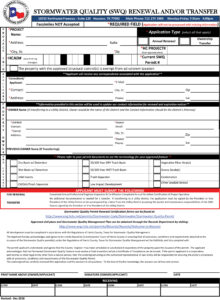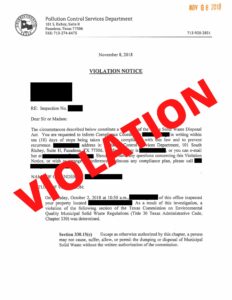 Have you received a stormwater quality permit renewal notice or notice of violation? If you have, don’t panic.
Have you received a stormwater quality permit renewal notice or notice of violation? If you have, don’t panic.
And if the letter comes from the city or county attorney’s office, don’t panic. And definitely don’t ignore it! It won’t go away.
So what do you do? Well that depends on who sent the notice and what it says.
Permit Renewal Notice
If you’ve received a permit renewal notice from the city or county it is typically just a reminder of an upcoming permit renewal. Stormwater Quality permits renew annually in perpetuity so you should be receiving these every year.
If not it is most likely because the contact information on file with the city or county is incorrect. It is the developer who typically pulls the initial permit so notices may be going to that contact and never making it to the property management team.
And if the property has been recently purchased it’s more than likely that the permit is still in the previous owner’s name. These permit renewal notices are sent out 30-60 days prior to the permit expiration date which should give you plenty of time for any maintenance or repairs necessary.
If the permit was never transferred into my name I’m not responsible, right?
That can get a little complicated but the short answer is you are not responsible in the eyes of the regulators, but the purchase contract likely releases the previous owner of future financial obligations beyond the date of sale.
That being said the city and county require that the permit is transferred to the new owner within 30 days. You can find a link to the City of Houston Ordinance here, and Harris County here.
So if you are the previous owner and have not transferred the permit then you are still the responsible party. And the bad news is that if the permit is late it must be brought current prior to transferring ownership.
And in the case of stormwater quality detention ponds, if the pond is not in permittable condition (and probably wasn’t upon sale) it may require lawyers to sort out who is paying for the repairs in order to bring the permit current, just so that we can transfer to the new owner!
Of course this can all be alleviated by transferring the permit within the 30 day time frame. If you are the new owner and the permit was not transferred, ignoring the situation is not advised. Unfortunately, late fees will be assessed.
And as stated above, your sale contract most likely obligates you to transfer all permits in a timely manner and assume financial responsibility for such permits, meaning you’ll be paying more as late fees stack up. Additionally, the system may need maintenance or repairs.
And the more time passes, the harder it is to prove that the system was not functioning properly upon the sale, meaning even though the system was not permittable upon sale, you may be stuck holding the bag for repairs. Repairs which become more costly as time passes.
If you are the buyer this can easily be alleviated by calling us out to do a free assessment prior to purchase. Our goal is always to protect our customers (or potential customers) from these costly oversights.
Notice of Violation
 A notice of violation is certainly more serious than a permit renewal notice and requires immediate attention.
A notice of violation is certainly more serious than a permit renewal notice and requires immediate attention.
Failure to take this notice seriously will inevitably lead to additional fees and fines so don’t ignore this hoping it will go away…it won’t.
These notices are sent out for one of two reasons, one much more serious than the other.
standard notice of violation is sent out in the event that an owner fails to complete the annual repermit by the expiration date. This is a simple reminder.
And while late fees may be assessed, there won’t be any legal action at this point. But you do need to get the permit renewed immediately.
The other type of notice is much more serious and reserved for those properties that have been out of compliance for several years and attempts by regulators to encourage compliance have gone unanswered or ignored.
After multiple unsuccessful attempts with the carrot the situation has now escalated to the stick. Unfortunately the stick is the city or county’s legal department and we all know lawyers don’t go away.
They will find the responsible party and proceed with legal action. Now if you have received this type of notification don’t panic. There is still time to resolve this without incurring thousands in legal fees.
But again, ignoring the notice is not advisable. You should contact the sender immediately and keep open communication throughout the process.
Additionally, you should engage a stormwater quality services company that has experience managing this process and knows the lingo so to speak. The issue that you’ll most likely face is that the stormwater quality feature is probably non-compliant and has been so for years.
So engaging a professional to help will save you time and money in the long run. How? Because often (as in the case of detention ponds) the feature may fall back into disarray after repair simply due to the topography or existing conditions, meaning that what is permittable this year may not be in the future.
Remember that these permits renew annually and require photo documentation. So maybe the pond isn’t such a good idea for stormwater quality. In a case like that (which happens fairly frequently) we can move stormwater quality to an end of pipe or inlet based system, which (as long as maintained) will always be in compliance, and usually costs less than pond repairs.
But be warned. Dirt contractors and landscape contractors aren’t stormwater focused. So if you ask them to fix the pond (please don’t ask a landscaper to do this. That’s like asking your auto mechanic to fix your airplane.)
They will do their best, but unfortunately they don’t have the knowledge or understanding required to think outside the box and look at the big picture, which is a sustainable solution that can be permitted not just this year but every year.
So if you’ve received one of these notices give us a call for a no cost site assessment. We will provide a detailed report with photos to include the current condition, repair options, and future considerations to prevent problems from resurfacing.
Additionally, we can schedule regular (required) site visits to address these issues as they come up, saving you from the surprise maintenance cost that nobody likes.
